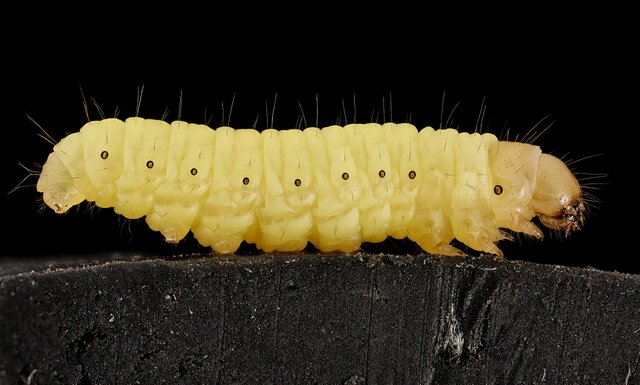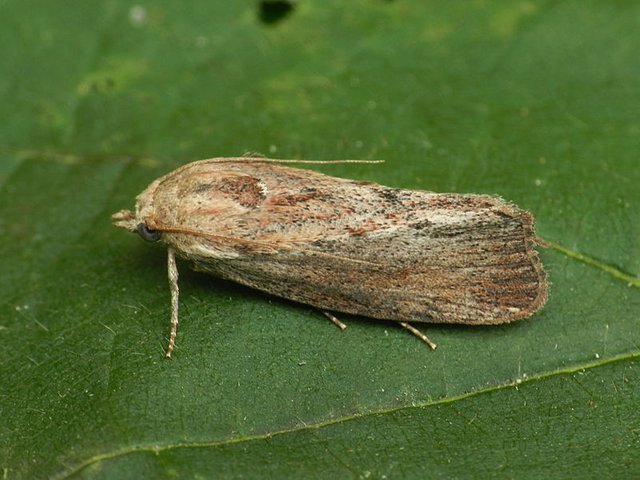Plastic degrading caterpillar
Larvae of the wax moth Galleria mellonella digest plastic rather fast.
Not long ago I wrote a detailed article about our plastic problem and some interesting observations of plastic digesting organisms.[1]
Just recently the female Italian biologist and hobby beekeeper Federica Bertocchini found larvae of the wax moth Galleria mellonella[2] in a bee-hive and put them into a plastic bag. She was very surprised to see that after a while there appeared many holes in the bag.
Larva of Galleria mellonella:

Von Sam Droege - http://www.flickr.com/photos/54563451@N08/19051745004/, Gemeinfrei, https://commons.wikimedia.org/w/index.php?curid=41690212
Together with her colleagues she started to monitor the animals within the frame of several tests, and found out that they are able to degrade plastic bags made of polyethylene (PE)[3] rather fast, where the end product is ethylene glycol. Furthermore the tests displayed that about 100 larvae of Galleria mellonella can eat circa 92 mg plastic within 12 hours. After only 40 minutes one could see the first holes in the bag.[4] This is faster than any other observed organism incorporated plastic until now.
The research has been published in "Current Biology".[5] The scientists seek to discover and hopefully extract the responsible enzyme(s), which enables the caterpillar to degrade PE. "If a single enzyme is responsible for this chemical process, its reproduction on a large scale using biotechnological methods should be achievable" said Cambridge's Paolo Bombelli, first author of the study published today in the journal Current Biology.[4]
One possible reason, why of all things these insects are able to degrade polyethylene, is that the beeswax on which they are growing can be considered as a kind of "natural plastic", whose chemical structure is not completely different from the structure of PE.
Adult moth:

Por Adam Furlepa - Obra do próprio, CC BY-SA 4.0, https://commons.wikimedia.org/w/index.php?curid=34651485
Sources:
- https://steemit.com/science/@jaki01/about-our-serious-plastic-problem-and-one-interesting-discovery-plastic-degrading-bacteria
- https://en.wikipedia.org/wiki/Galleria_mellonella
- https://en.wikipedia.org/wiki/Polyethylene
- https://scienmag.com/caterpillar-found-to-eat-shopping-bags-suggesting-biodegradable-solution-to-plastic-pollution/
- http://www.sciencedirect.com/science/article/pii/S0960982217302312
Everything which could help to combat our disastrous plastic problem should be further researched.
Amazing article, @jaki01. I saw an article about those nice little fellas on "Spiegel Online" and wanted to tell you about them. Apparently, there is no need to do that any more. Keep up the good work! :-)
Great post, I heard about this news today on the TV. This it could be a great discover in the environmental remediation (maybe the enzyme can dissolve the plastic thrown into the oceans), but the loot against plastic pollution cannot be considered win if people don't change their behaviors.
Great post! :)
I especially enjoyed the picture of the plastic bag with holes in it. I find it amazing that the larvae can chew visible holes within 40 minutes! Astonishing.
Great discovery indeed. I saw it this morning on the news, hope this can really help to diminish our plastic problem!
Would be amazing if this could solve our problems with plastic trash around the world!
I see great potential in extracting the responsible enzyme and reproducing it by biotechnological methods, but we still need to wait for further results.
The biggest problem are still we ourselves, because of our simply uncivilized behavior to spread our rubbish all around the planet! It always annoys me so much to see all that dirt everywhere.
I agree people are the main thing we need to be concerned with when we think about trash that is not very biodegradable.
Excellent post! I like your work My friend
Thank for sharing.
Good science.
Congras @jaki01
This post has been ranked within the top 80 most undervalued posts in the first half of Apr 25. We estimate that this post is undervalued by $1.48 as compared to a scenario in which every voter had an equal say.
See the full rankings and details in The Daily Tribune: Apr 25 - Part I. You can also read about some of our methodology, data analysis and technical details in our initial post.
If you are the author and would prefer not to receive these comments, simply reply "Stop" to this comment.
A bit scary to me. It means they can just about eat anything. Someone will soon find military application for this.
Haha, we are about to solve one of the biggest environmental problems ever, but @ace108 is scared. :-)
Actually I have no idea, if in future these insects (or their enzymes) can be used also for military purposes (but you are right: in history nearly every invention has been used for that reason, too, if possible - humans may be intelligent, but not wise ...).
Yes, only time will tell. Mr Nobel did not want his dynamite in certain use he didn't intended them for.